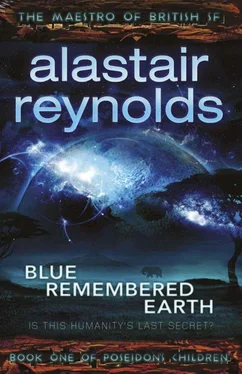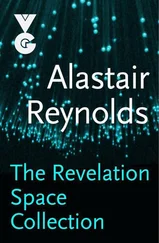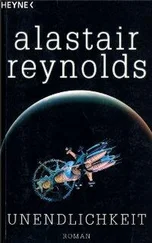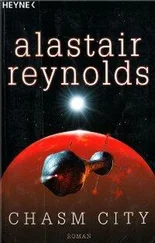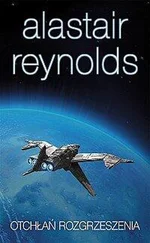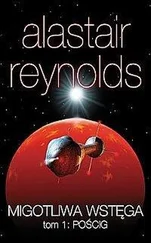He pushed away.
‘I’m free,’ he reported.
‘Can you see Hector? He’s out of my sightline.’
‘Must be on the other side of the aerobrake.’ Geoffrey positioned his hands over the matched thruster controls and applied a burp of thrust. ‘Hector, can you hear me?’
‘Still with you, Geoffrey. I gather you’re outside the ship.’
‘You knew I’d follow.’
Hector let out a sniff of amusement. ‘I suppose I’d have done the same thing. Doesn’t excuse either of us, though.’
The thrust had steered Geoffrey away from the hull. He looked back, seeing the ship in its entirety for the first time. The aerobrake was a braced circle blotting out a significant fraction of the sky, slightly dished on the surface he was looking at, aerodynamically convex on the other. Even with his eyes amped, there were details he couldn’t make out. The shadows were black, the lit surfaces gloomy.
He would have to edge out from the cover of the aerobrake if he was to follow Hector.
White light rimmed the circular shield, turning it into an eclipsed sun with its own corona. The light faded. He’d felt nothing, heard nothing, but he knew that another package had just hit the aerobrake.
‘Hector?’
‘Still here. How’s Jumai?’
‘I’m fine,’ she replied.
‘Don’t even think about coming after us,’ Hector added.
Geoffrey arrested his lateral drift. He was beginning to emerge from the protective shadow of the aerobrake, with the iceteroid’s launch systems looming into visibility again. Almost immediately, the visor dropped an icon over a tiny point of light. Next to the icon, distance and velocity numerics pointed to an object two kilometres ahead.
‘I see you, Hector.’
‘Good. You’ve made your point, now go back inside.’
Geoffrey stabbed at the arrow-shaped control studs, orientating himself in the same rough trajectory that Hector was already following. He applied a thrust burst, saw the hull of the ship begin to slide by. The aerobrake was looming closer. He studied its approach, hoping he’d given himself enough clearance not to ram against its underside or clip the edge as he passed. The icon put him eighteen hundred metres behind Hector now, but Hector was still pulling ahead. Strobeflashes of blue fire marked his thruster inputs. He was gunning it.
Geoffrey was sliding past the aerobrake now. He’d cut it close – as it neared, it looked as if he’d made a fatal misjudgement – but it whisked past him in absolute silence, and looking back he was at last able to inspect the damage to the ship. It was worse than he’d been expecting. The ice impacts had blasted away the aerobrake’s ablative cladding in metre-thick chunks, exposing an underlying integument of geodesic support elements and shock dampeners. No matter that eighty per cent of the aerobrake was still intact, it was now useless for its intended function.
His suit veered sharply. A fist-sized boulder whipped by in the night. He guessed it was debris from the aerobrake: the suit had detected it and taken evasive action.
‘Jumai,’ he said, ‘stay suited, and make sure you’re clipped into a thruster pack. The ship can’t take much more punishment.’
‘Yeah. I figured that out for myself.’
The timbre of her voice was different, and it took him a moment to understand why. She was on suit air.
He looked back again: just in time to see a tiny figure emerge out of eclipse from behind the aerobrake.
Knowing there was nothing to be done – he could hardly argue with her, when he’d done exactly the same thing – he returned his attention to Hector’s distant form. Twenty-one-hundred metres and receding. He gunned his own thruster pack again, feeling the pressure as it nudged his spine. He held the studs down as long as he dared, watching the relative velocity reach zero and then begin to climb into positive digits. Geoffrey guessed that he’d traversed a kilometre himself, about the length of the ship, since clearing the aerobrake. Hector must be nearing the halfway mark, and he was still out there, still alive.
Blue fire streaked past: superheated steam from an ice package, stabbing out from Lionheart like a chameleon’s tongue. The entire cosmos pulsed white. He looked back, saw the aerobrake glowing against the dim grey nimbus of the inner solar system. The glow faded, darkening to red, then black. There was more damage.
‘Jumai?’
‘Still here. Am I the only one who’s starting to worry about what we do without a ship to get us home?’
‘We can manage without the aerobrake, provided we can top up the tanks with whatever fuel that engine uses,’ Hector said. ‘All I have to do is persuade Lionheart that we’re its new best friends. Doesn’t sound too difficult, does it?’
‘When you put it like that…’ Geoffrey said.
‘I’m about two kilometres out. I can see the lock from here. If the protocols are standard, I shouldn’t have any difficulties working the outer door. I’m a little off-beam, so I need—’
Something white flashed ahead.
Geoffrey’s first thought was that Hector had started correcting his angle of approach, or had even begun to reduce his speed in readiness for landing by the airlock.
That wasn’t it.
‘Hector?’ he asked, dreading what his senses were telling him: that the flash had been much too bright to have been anything so innocent as a course correction.
Hector wasn’t answering.
On the area of Geoffrey’s visor reserved for comms status, a red warning symbol began to pulse.
‘Hector!’ he shouted.
But he knew the truth. He didn’t need the helmet to tell him that. Hector wasn’t responding because Hector wasn’t there any more.
‘He’s gone,’ Jumai said. ‘Isn’t he?’
The two of them were still falling towards Lionheart, towards the point or surface in space where Hector had been intercepted and neutralised.
There wasn’t time for shock or grief, or even terror, over and above the fear that Geoffrey was already experiencing. Just the immediate and pressing calculus of survival. At his present rate of fall, Geoffrey would be passing Hector’s place of execution in only a dozen or more seconds.
‘Do nothing,’ he told Jumai. ‘No course adjustment, no speed adjustment, nothing. Not until we’re almost there.’
‘What happened?’
‘Hector must have directed a burst of thrust towards Lionheart. I don’t think it saw him until then. I don’t think it noticed him. He was just too small a target compared to the ship, and with all the debris floating around from the aerobrake—’
‘You hope.’
‘If I’m wrong, we’ll know it very shortly.’
He supposed that, of the myriad modes of death one might contemplate, being annihilated by a chunk of catapulted ice shot across space so quickly that it arrived without warning, was not the worst way to go. It would be painless. There would be no pain because once that ice touched him – once its kinetic energy began to convert into heat and mechanical forces – there would be no him to experience sensations of any kind whatsoever. He would no longer be an organism. He would be a pink nebula of rapidly expanding and cooling steam with some mixed-in impurities.
But he must have been right about Hector, because Lionheart refrained from killing him. He waited until the dull red world felt only a breath away, a hand’s reach. He didn’t dare begin to slow down until then. Although he knew that the suit had the ability to detect and avoid collisions autonomously, he wasn’t trusting it to arrest his forward motion. Closing his eyes – he did not want to see the ground coming up if it was clear he wasn’t going to stop – he jammed his thumbs onto the reverse-thrust studs. A few seconds passed before it occurred to him that if he didn’t monitor his progress, he might push himself back out into space again.
Читать дальше
